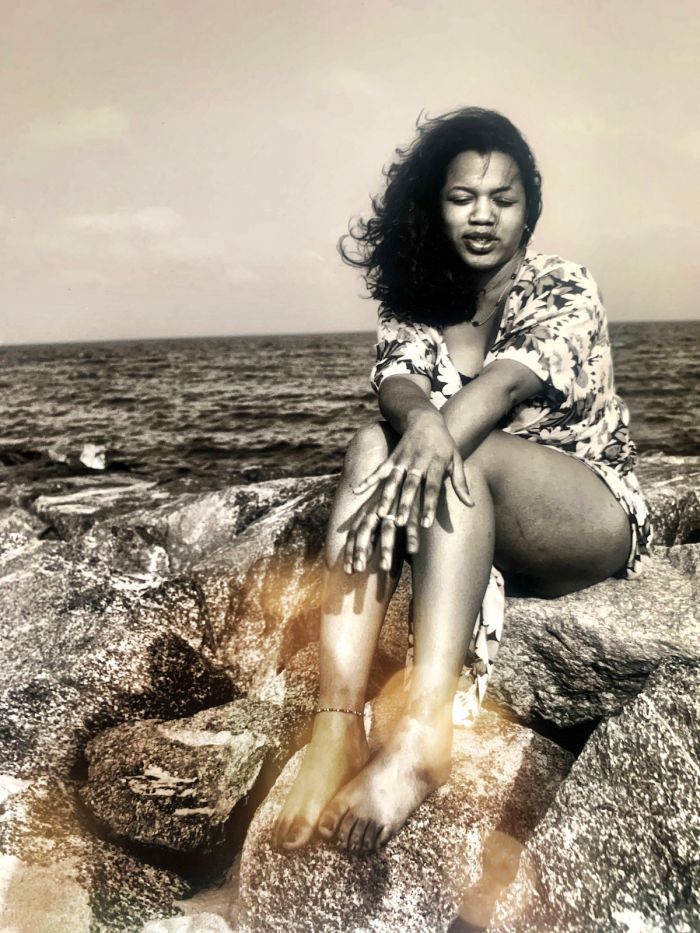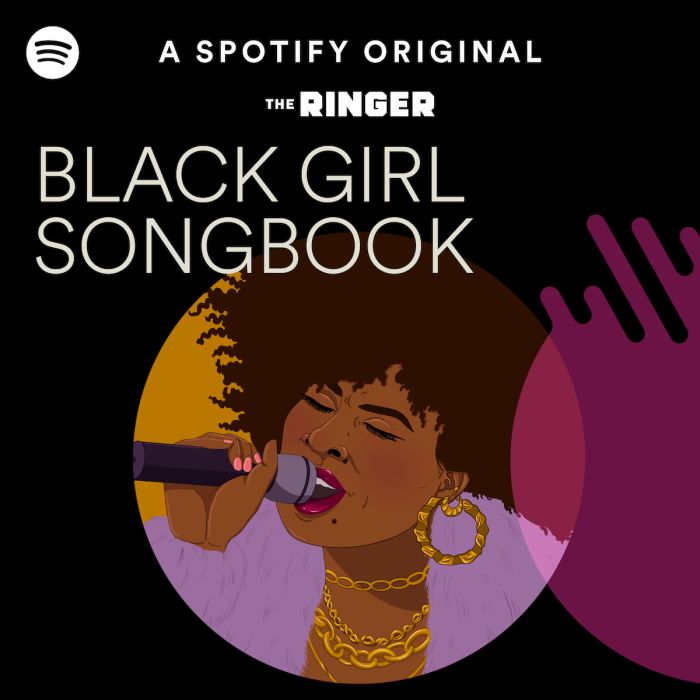March is Women’s History Month and that makes it the perfect time to highlight Danyel Smith’s Spotify podcast “Black Girl Songbook.”

Source: Carl Posey / Carl Posey
The show features celebrated journalist Danyel Smith (former EIC of VIBE/editor at Billboard with bylines for ESPN, NPR, Rolling Stone and more!) as she celebrates and uplifts the talents of Black Women in the music industry – songwriters, producers, executives and more. On every episode of “Black Girl Songbook,” you will hear the music of Black women and stories from Danyel citing her decades of life experience, music, love and beyond. The show is genuinely all about Danyel giving Black women their much deserved flowers.

Source: Spotify / Spotify
BOSSIP Senior Content Director Janeé Bolden interviewed Danyel Smith about the new Spotify podcast. Check out their chat below:
Janeé Bolden: So we’re talking about “Black Girl Songbook,” which I love the title, and I’ve listened to every episode and I think it’s something very unique that you’re doing.
Danyel Smith: Thank you.
JB: Yeah, your podcast is very different. I feel like you do a great job of combining a guest along with a featured artist, but you also almost are doing — like lectures, music lectures.
DS: I used to teach, so I don’t mind lecturing… I just feel like these stories are under-told and I do want to tell them. However, sometimes they make me emotional. Sometimes I feel like I need a guest to help me through it.
JB: How do you decide who you feature each week? I think the timing was so perfect for Whitney Houston for the opening episode because of the Super Bowl.
DS: Right, I mean I think one of the things that I carried over from being an editor for so long, is just that editorial thinking, that magazine thinking, where you want to time things that would be a part of a conversation that you know was going to be occurring so that whoever is being featured on the show becomes a part of the larger conversation and more people can know about it. So I definitely am trying to carry that over whenever I can, but I also just feel like I just wanted to start with Whitney anyway, for any number of reasons. So many of the decisions we’re making are based on love and emotion. Who do we just love? I don’t care how lifted up she is in our culture. It’s not enough. No matter how much we talk about her, and just the very tragic way that she died and the way her daughter died, it still has never been told enough. And I just want to go in whenever I can and just talk about it.
JB: I love how you advocate for the women, like when the Ciara episode was on, you talk about some of the difficulties she’s had with people really talking about her more for her relationships than for her musical contributions.
DS: It’s rude and it’s unfortunate that people were really coming at me in the tweets because I said that Ciara is part of Janet Jackson’s legacy and can be mentioned in the same sentence. My whole thing is, we have to embrace these artists from the like 2000s and the 2010s and stop acting like everything stopped at the 90s and nothing else can ever be grand or iconic again. It bothers me that the work that somebody like Ciara puts in and that she was put down at her height or that people think she always needed help from a guy when the read is she was the one helping the guys out!
It is advocacy and it also is just me just being somewhat tired of it. You know what I’m saying?
JB: I really feel like I learned so much about you through the podcast, like when you were talking about your first marriage and how when you guys first started out and you would cover shows and he would be taking pictures or doing photography and you would be writing about the shows. How do you decide what personal information you’re comfortable sharing on the podcast?
DS: It’s literally the hardest part. Even hearing you say it back to me I’m already like, ‘I really did say that on this show.’ I think it’s taken me a long time to really talk about it, especially to talk about my ex-husband. A lot of people don’t even know I had a first husband. People assume I’ve been married to Elliott since I was in 12 grade, but that’s just not true. I married (fellow music journalist) Elliot [Wilson] five days before my 40th birthday, but it’s very difficult to talk about those things, but the thing is, I think, at least for me now, what am I saving it for?
The two projects that are most important to me in my life right now are my show at Spotify, “Black Girl Songbook” and my book “Shine Bright: A Personal History of Black Women in Pop Music, which is being published in September by Random House and both of the teams on those projects, Chris Jackson at OneWorld Random House and the whole team at Spotify and the Ringer, from Sean to Trudy, to Loni to Tunde, to Juliet, everybody, they’re like, ‘You have to tell your part in it.’ Whichever way they say it to me, that is what they are saying to me and it takes some pushing from other people honestly to do that, but then when I do it, I just feel better and I feel women especially, or even some men, will say to me like, ‘I listened to Estelle talk about her relationship with her mother and that made me ask myself, what was my daughter going to want to ask me in 20 years?’ You know? Somebody said to me, ‘I came to the show hoping for a good playlist and stuff and next thing I know I’m in a deep conversation with myself about what does love really mean?’ And to me that’s the highest of compliments because I have that type of emotional relationship to music. Music marks every part of my life, from my first husband, my marriage to Elliot, different jobs mean different songs, you know, different friendships mean different albums like it’s all of a piece. I’m just ready to put myself in the stories. I’ve been disciplined mostly over the years with removing myself. I’m doing a story about, you, know somebody, it’s about them. Yeah I have to insert myself a little bit. OK, maybe I will, but I’m not gonna sit up and tell you my whole story in the piece, right? Well, this time you know what? I am. I feel it in my bones and I hear it from my producers.
JB: It definitely resonated with me in that way, as far as making me more emotional, particularly the Natalie Cole episode was very emotional for me.
DS: So why do you say that I’m curious?
JB: So many different things I think just learning about her in a way that I hadn’t heard before. More of the personal side. How the press pitted her against Aretha early on. Learning about the relationship with her producer. I am definitely younger so Natalie Cole is someone who I didn’t experience outside of like you know, the songs that she was really big for. In my work as a journalist sometimes would cover events so you would have the pictures of her and I obviously knew the relationship with her father, but I didn’t know things about him. Like for example the way you spelled out him catching so much flak for performing in front of white audiences. All of those things were like, just like, really, you know, I think it’s an interesting time to be black. And it’s an interesting time to be a woman. I think I respond to music and art on a very emotional level. If I can tap into something that can make me cry, then typically there’s art there, there’s something powerful there if it can move you to that point.
DS: I do feel I do share that with you. I don’t have a problem getting emotional about art and I’m learning how to. The podcast and writing the book is really helping me, like I said, not run from that emotion.
Natalie Cole saved my life as a kid. I had a very nontraditional, painful, in a lot of ways, childhood and the joy that she would bring to my life. Like even right now talking about it, it’s like she would make me just feel like ‘OK, I can do this.’ There’s more to life than what I’m experiencing. I feel like a lot of times, I keep going back to this, because it’s true to me. The music of men gets talked about like this so often, it’s like meticulously gone over lyric by lyric. It’s lifted up as genius and the collaborations are talked about like they’re iconic and every little ooh and ahhh and Songwriting Hall of Fame and in the Rock and Roll Hall of Fame and covers of magazines where they don’t have to be naked and this that and the third. Where people don’t talk about the women in the music of black women like that. And our music is in the soul of everything. It gets emulated by everybody. And it just gives and is talked about like it’s regular or something when it’s priceless and it just bothers me.
I think just the years that I have of interviewing people, you know people, you just know people over the years in the industry. And then you know you have a good interview with somebody. And then maybe you run into them out one night, another woman and maybe you know there’s drinks and you start talking and and people are are disappointed. Women performers that I see that I know. They are disappointed. They are concerned about their legacies. They worry that the work if they put in isn’t appreciated. They always make them stop working. Except for sometimes they do. I think of somebody like Sade, for example people are like ‘Why did Sade take those breaks? And I’m like, ‘Perhaps Sade is tired. Perhaps Sade sees other people that are being lifted up twice as high for doing half as much.’ The amount of lives affected. The amount of records sold. The amount of successful tours. The model that she sets for trying to live some type of balanced life. The type of mom she is. There’s a lot of people who live those kinds of lives that are still constantly and completely lifted up his geniuses by the mainstream. But she doesn’t find herself in that position and I feel that is criminal.
JB: Do you know who’s next in upcoming episodes? You mentioned you love Jhene Aiko and Ella Mae, are we going to get “Black Girl Songbook” episodes about them?
DS: I was gonna say Spotify loves to lay down the line. I’m not supposed to talk about what’s coming next, but I’m gonna say all my favorites are getting episodes. I mean, I have producers and they’re amazing, but man, listen, we have plenty of episodes and I’m going to get my faves. I mean if they don’t get a whole episode then come on as a guest and talk about stuff in general. But I’m I am definitely getting my faves in there. There’s no doubt about it. It makes my day that you’re listening.
New episodes of “Black Girl Songbook” are released every Thursday on Spotify.
*This interview has been condensed for








Comments
Bossip Comment Policy
Please read our Comment Policy before commenting.